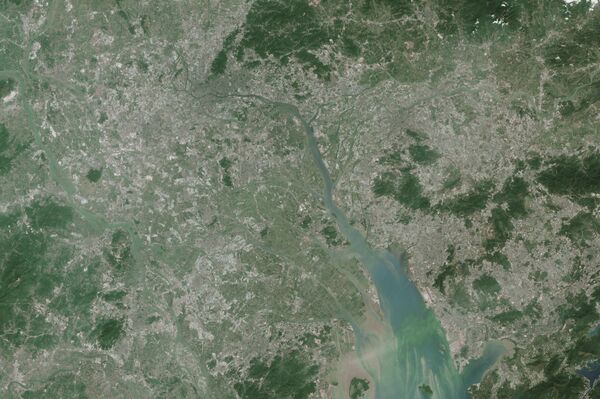There is a joke in China. They say you can predict the "it" colour for the season by looking at the colour of the river.
In 1998 the US space agency, NASA took a satellite picture of China's Pearl River with a dark blue streak of pollution running through it, and they captured this area up until 2003. The images show the dark blue streak and the impact of urbanization on the area.
How #FastFashion Is Killing #Rivers Worldwide https://t.co/EqqJ9ldge3 @RiverBlueMovie @CIFF #CIFF41 #worldwaterday @Waterkeeper @Oceana
— EcoWatch (@EcoWatch) 22 March 2017
The destruction of rivers across the world has been examined in a new film and documentary titled RiverBlue, which explores the danger that the fashion industry poses to the environment.
The film follows international river conservationist, Mark Angelo, as he travels across the globe to investigate the world's most polluted industries such as fashion.

RiverBlue is hailed as "groundbreaking" by critics who say it looks closely at the destruction of rivers globally, the effect it has on humanity and the solutions to try and inspire hope for a more sustainable future.
Through harsh chemical manufacturing processes and the irresponsible disposal of toxic chemical waste, our favorite fashion items destroy rivers and impact the lives of people who count on these waterways for their survival.
Just watched one of the most important films of 2017: River Blue. Know where your denim is made. Thanks @BKaccelerator @RiverBlueMovie
— Janette Tilley (@janette_tilley) 23 March 2017
Mr. Angelo states within the film that he has always been captivated by rivers and the power that they harness within them. However he also states that he has seen so much that troubles him and that the textile industry is destroying the world's most natural resource.
The film travels to Bangledash and visits a place called Buriganga in Dhaka, which is home to more than 50 million people. It also has hundreds of textile mills and leather tanneries. The river in this city has become one of the most polluted in the world. The textile manufacturers use chemicals that can disrupt hormonal and nervous systems. The film shows young children working with leather skins, which have resulted in long-term health problems.
India also has over 400 tanneries. The industrial city of Kanpur has a river that is subject to toxic chromium dumping, which as a result turns up in cows milk and agriculture products.
Sunita Narain, who is the director general of Center for Science and Environment in India has said that this toxic dumping is deliberately destroying the environment.
"We are committing hydrocide. We are deliberately murdering our rivers," Ms. Narain said in a recent interview.
So could brand name clothing companies be disregarding the environment in their quest for profits and what part does the consumer play within this complex story?
"Low cost clothing has a high cost attached to it, one to the environment and public health," Mr. Angelo says within the documentary.
"It was the area of China where most of the blue jeans are manufactured, I thought everyone wears jeans. We could bring this problem to the world stage," Ms. Narain said in a recent interview.
Angelo does believe that there is a solution to this problem, which would focus on corporations being accountable for their environmental practices, ensuring that no one has the right to damage or destroy a river. More needs to be done within the textile sector, who have to commit to a fashion industry without pollution.
Mr. Angelo also believes that the consumer has power and that they have to seek out clothing made in an environmentally friendly manner.




